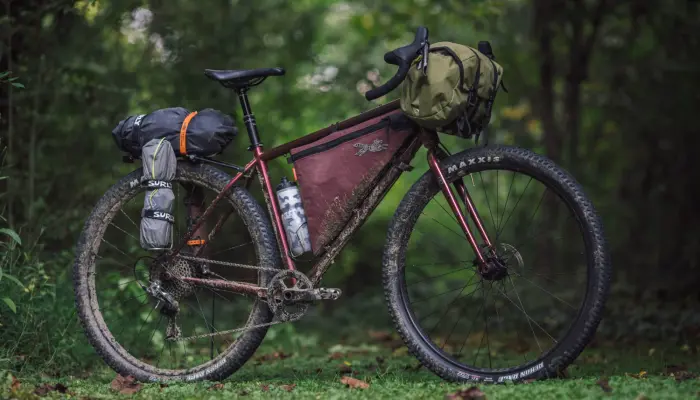You may have encountered a situation where, having gone on a trip, you found that you forgot some trifle that you knew would be necessary. What to take with them on a bike trip? We will consider this in this article.
In a bike trip, two bags are important: a suitcase and a bike bag. How you pack them will affect your trip.
Bicycle Helmet
This item deserves a separate section before we move on to the rest. In addition to the fact that bicycle helmets are a sensible idea, they are also mandatory by law in most countries. You can take your own helmet with you or purchase, rent, or borrow one during the bike trip.
Initial Considerations
There are several important factors to consider before any bike trip: what the weather is like at the destination, what temperatures to expect, how many kilometers we will ride daily. Having thought over these questions, you can start packing. The weight of your suitcases does not matter, as we will be transporting them from hotel to hotel (there may be restrictions if you are flying to the destination). Think ahead about what attractions you plan to visit during the trip – for example, if you want to visit many churches, then it would be a good idea to be able to cover your knees and shoulders.
What to Pack in Your Suitcase
During a week-long or longer bike trip, there will always be a lot to see and do, so pack accordingly. Here are some things that should definitely be in your suitcase:
- Functional underwear for the whole trip
- Short and/or long cycling shorts depending on the weather (it’s also nice to have the option to change along the way)
- Comfortable t-shirts
- Casual evening wear
- Sneakers
- Warm sweater
- Light jacket
What to Pack in Your Bike Bag
Bike bags are always included in bicycle rentals. In them, you should pack the necessary things for the day, as well as identification, money, phone, etc. Tools, pump, lock, and spare tubes are included in bicycle rentals, and there is always someone to call if there are problems with the bicycle.
- A small tool, for example, an adjustable wrench, tire lever, toolkit
- Repair kit
- Spare bicycle tube
- Pump
- Bike lock
- Raincoat
- Sunscreen
- Sunglasses
- Insect repellent spray
- Snack/snacks (e.g., fruits, muesli bars, or a sandwich)
- Water (preferably 2 bottles)
- First aid kit
- Reflective vest (so you are clearly visible if it gets dark)
Here is a small list of things that must be with you on any bike trip.
Nutrition and Hydration
Planning nutrition and hydration is crucial for a successful bike trip, especially on long trips. Insufficient nutrition and dehydration can lead to fatigue, headaches, and decreased performance. Here are some tips:
- Take with you high-calorie snacks such as nuts, dried fruits, and energy bars to refuel while riding.
- Drink water regularly, not waiting until you feel thirsty. It is recommended to drink about 0.5 liters of water every 1-2 hours of riding.
- Make frequent stops for snacks and recovery.
- Plan meal spots in advance, especially in remote areas.
- Replenish your water and food supplies whenever possible.
Navigation and Communication
In bike trips, it's important to have reliable means of navigation and communication to avoid getting lost and stay connected with the outside world:
- Use GPS navigators or smartphone apps, download maps in advance for offline use.
- Always carry paper maps in case of battery drain or no signal.
- Ensure your mobile phone can operate in roaming in the destination country.
- Take a portable charger for your smartphone or GPS navigator.
- Inform family or friends of your route and check in periodically.
Safety Tips
Safety should be the top priority in any bike trip. Here are some important tips:
- Always wear a helmet and reflective clothing when riding a bike.
- Follow traffic rules and be cautious on the roads.
- Have a first aid kit with you and know the basics of first aid.
- Be careful when encountering wild animals, do not approach them or provoke.
- Learn about potential risks and dangers in the areas your route passes through.
- Travel in a group or inform friends and family of your location.
Eco-Friendliness and Respect for Nature
Bike trips often go through beautiful natural routes, and it's important to minimize our impact on the environment and show respect for nature:
- Do not leave behind trash, take all waste with you.
- Use reusable water bottles and food containers, avoid disposable packaging.
- Do not go off designated routes and trails to avoid disrupting the natural habitat.
- Maintain silence and do not disturb wild animals.
- Keep campfires in designated areas and thoroughly extinguish them.
- Learn about local rules and norms for visiting natural areas.
Cultural and Local Features
When traveling through different countries and regions, it's important to respect local culture and traditions. Here are some tips:
- Learn about local customs, traditions, and behavior norms in advance.
- Be polite and respectful to local residents and their way of life.
- Avoid offensive or inappropriate behavior that may be perceived negatively.
- Try to learn a few phrases in the local language; it helps establish a connection with local residents.
- Respect local laws and rules, even if they differ from those you are accustomed to.
- Be open to new cultural experiences and strive for understanding and respect of differences.
